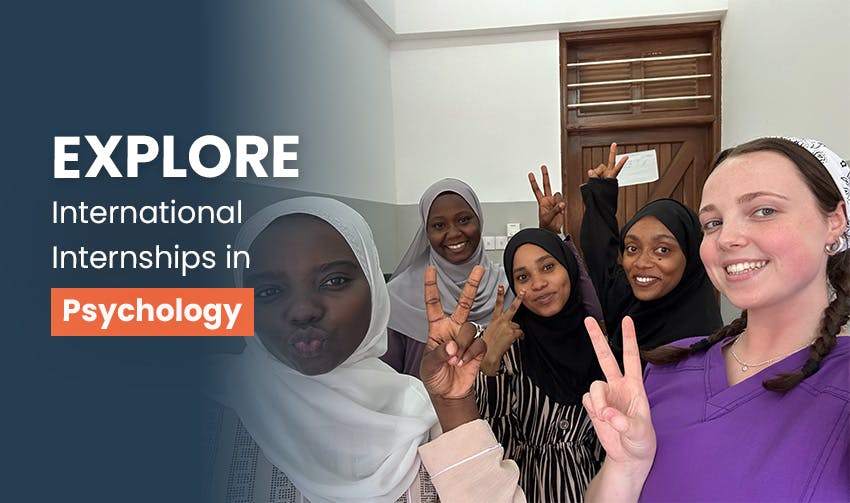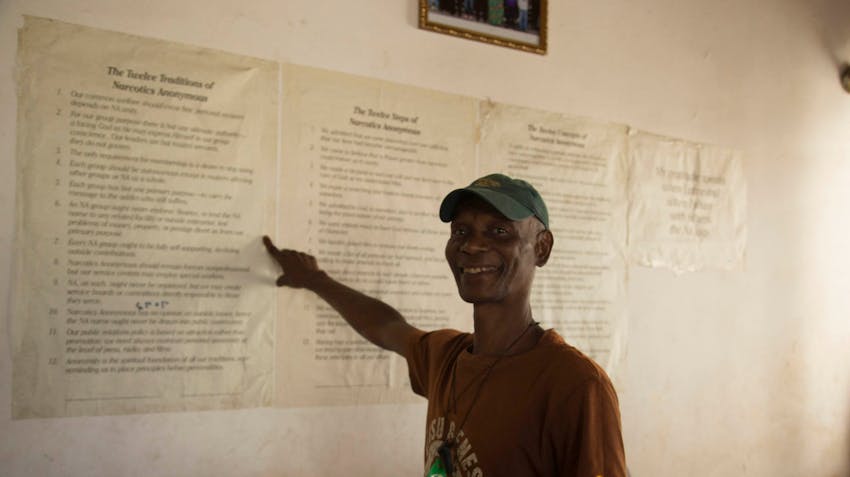
Want to know what a Psychology internship in Zanzibar is really like? You’ve come to the right place! These popular internship opportunities attract students and young professionals from all walks of life, who are keen to grow their experiences and knowledge. But what are the internships really like? What can you do as an intern? What should you expect? With Mia’s help, we break it all down and provide the inside scoop on Psychology internships in Zanzibar.
Hi Mia! Why did you choose to do a Psychology internship in Zanzibar?
I chose a psychology internship in Zanzibar because psychology has always been of interest to me and it directly correlates to my undergraduate studies. I decided to travel across the world to Zanzibar to gain more education in the differences in culture and psychology in the world.
During my internship I participated in counseling sessions, psych education, and assisted in several different cognitive behavioral therapies and behavior modification techniques in a psychiatric hospital. I worked with addiction, recovery, and various different mental health disorders. I could sit in on therapy sessions, assist in taking patient history, accompany the patients in occupational therapy, and give input on diagnosis and treatment management.
This Internship allows me to get a career perspective from many different psychology occupations, such as, social worker, psychologists, mental health counselor, and nurse. This gives me the opportunity to see what occupation I think I would fit into and is something that I would like to do in the long-run.
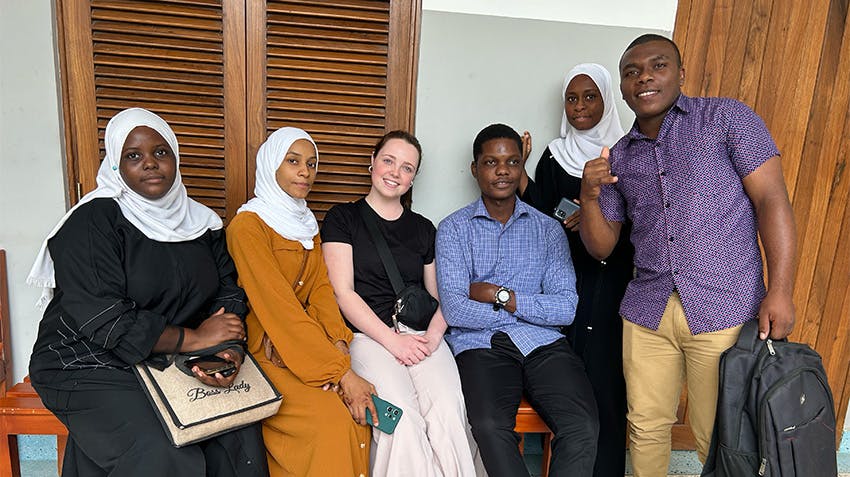
What was it like when you arrived in Zanzibar for your internship?
My first week in Zanzibar started off very stressful, my luggage was delayed getting here so there was the added stress of not having any of my personal items - on top of emerging myself in an environment not known yet to me.
I knew that Zanzibar would be different from my home but I did not expect many of the differences. For example, I was not expecting the people of Zanzibar to be so friendly and kind all of the time. When I walked down the street, I was greeted by everyone (even when I do not make eye contact with the person), someone’s always saying hello or welcome to me. Although people are very friendly in Canada, it is unusual for me to address someone when they are not acknowledging me!
While traveling to my internship everyday I took the dala dala and as you drive out of Stone Town the amount of cars, bikes, buses, and people walking on the roads is insane. It was so interesting to see the difference in road conditions and traffic in Zanzibar compared to Canada.
I used Google Maps on my phone a lot to get around the town for the first week I was in town. During that time some of the locals approached me and expressed that they would rather I ask them for directions than use my phone (showing again how friendly the locals are). I kindly thanked the person for their input and replied that I am trying my best to get to know my surroundings on my own.
I was also not expecting differences, such as people eating with their hands instead of using utensils, and the time of day at which people eat.
I think the most memorable moment for me within my first week was when the Mother of the house that I am staying in (my homestay accommodation) took me on a walk around the town to see the sunset and we talked about my family and my home. This was memorable for me because this is something that I would do with my mom at home and it made me feel very welcomed and comfortable.
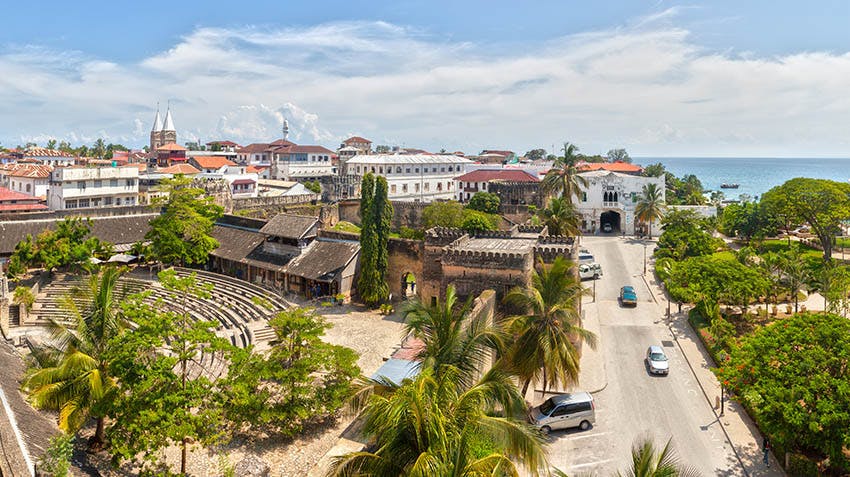
What were some of the cultural differences that made an impression?
The locals in Stone Town are very welcoming but also very affectionate which is something I struggled with. I mentioned it above (being greeted by everyone when I walked down the street) but sometimes the people were getting very close. Likewise, I noticed that when entering a building or room with people in there the individual who walked in will touch the hand of every woman in the room, no matter if it’s the first time meeting them or if it is someone they see on the daily. I believe it is a sign of respect. I’m not sure if this is something I could have prepared myself for in advance of the internship experience in Zanzibar but it is something that I learned to adapt to and throughout my stay, I did become more comfortable walking in the town.
Something else that I was not prepared for was the amount of attention I would get from the patients. At first I was a bit uncomfortable by this because I have never talked to patients before but as time passed I got more comfortable interacting with the patients like my peers did.
I noticed that when talking to a superior, the local students will always agree with whatever the supervisor says, even if they think the information is wrong. They respect their bosses a lot, and it was evident that within the culture, it is important to respect elders and people who are in positions of authority.
I also learned that nobody is in a rush to get anywhere in Zanzibar and nobody is penalized for being late. I would not want to fall into the habit of becoming late for work just because others do. However, it is still a challenge to work around different perspectives related to time management, as this can be very frustrating. For example, one example of this was when one of the doctors asked me to come into the hospital the next morning at 7AM. I did so, but the doctor themself did not show up until after 9AM. From this experience, I learned that if I am asked to be somewhere at a certain time that I shouldn’t expect anyone to be on time!

How did your experience evolve over time?
I had a weekly schedule that told me which patient ward I would be in for the week. However, on some days, the ward would not have any sessions, meaning that there was no need for a student intern to be in the ward. I found that on these days I wasn’t doing a whole lot in terms of learning but was more searching for guidance about where to go next.
I asked one of the supervisors if there was something I was missing or if there was something I should be doing differently on my day-to-day so that I remain busy and engaged. The doctor was initially taken back and then she told me that on the days I find that I have nothing going on, then it’s acceptable for me to enter different parts of the hospital and jump in wherever the medical team will allow me to observe or assist with.
By actively searching for feedback I learned a couple of things - the first being that the doctors are surprised by someone looking for “more” work when they finish or have none, and the second thing being that even as a student I am free to roam the hospital and patient wards as I please, and lastly, even though it can be difficult to get a clear answer it is not impossible to get clarification you just need to actively seek for it.
Overall, I learned to be more independent and confident in myself and my work. My expectations changed in the way where I learned that I do not have to ask permission to just jump in and help wherever I am needed. Some advice that I would give future interns is to have an open mind and don’t second guess every decision you make.
Were there any language barriers that you had to overcome?
Many locals made the assumption that I speak Swahili and English which is not the case, I found it very difficult to communicate with the language barrier and some of the locals became frustrated when they realized that I do not understand Swahili. I brought a Swahili language dictionary with me but I could have been better prepared for the language barrier if I had mastered certain common phrases and words in advance of the trip.
At the same time, I was also surprised at the amount of people who spoke English and could communicate with me. I was told that there would be very few people that would be able to understand and respond to me but so far everyone has at least an understanding of English.
This being said, it was sometimes difficult to understand locals using English because their words were not always correct. However, I tried my best to understand and be patient, as they also were patient with me. There were sometimes situations where the information from the doctors didn’t align with my existing background knowledge. I think that miscommunications were related to language barriers, as well as getting lost in translations, and there is a difference in the education systems, which impacts differences in perspectives and understandings as well.
I was likewise surprised to discover the similarity in the use of social media, I was not expecting to be asked about my social media here like people do in Canada. This was very exciting for me as I was able to communicate with my peers and coworkers on social media which is not something I thought I would be able to do.

What were some of your best strategies for success?
During my internship I was very friendly and displayed myself as a very trustworthy and comfortable person so that the patients would be comfortable with me in the room during sessions and they would trust me enough to tell me information about themselves and trust that I could help them in the best way possible. I actively would listen to every word the patients would say and not interrupt them when they would be talking about personal things.
One of the challenges that I overcame was related to asking the doctors questions. For instance if I asked an open-ended question, the response that I most often received was “yes”. Therefore, a communication strategy that I used to try and improve understanding, was to clarify myself or reword my question to see if it would produce a different response.
I also started taking more initiative and instead of asking the doctor about something, I learned that I could also review the patient’s file to help source more information and address questions. This has required me to build more confidence and step out of my comfort zone a little bit, taking more lead in the internship experience.

What did you do in your free time on the weekends?
Coming to Zanzibar I was worried that I could be by myself for the majority of the time but in reality, I had nothing to worry about! I have met some of the most incredible people in Zanzibar, other Interns and locals, and I was able to make hangout with people every day.
I strongly encourage exploring the island, Paje has incredible beaches and fun nightlife for those who enjoy, in Kendwa you can Jet ski and relax on the beautiful beaches.
Locals are a great guide for what is fun to do around the town and island! Some of the best nights I had in Zanzibar was hanging out with the locals around the town, an amazing way to get the FULL Zanzibar experience.
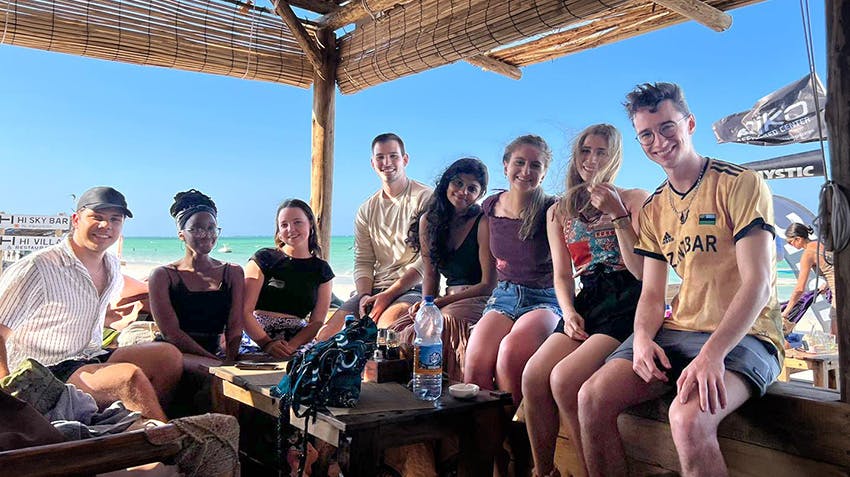
What are the lasting impacts of this internship experience for you?
Happy, caring, laughing and enjoying myself - at my internship I was able to do all of these things. I was able to show compassion with the patients, laugh with my peers and enjoy myself everyday living in Zanzibar meeting new people and learning about the country and the people living there.
My favorite memory from this internship experience would be walking into the hospital and having the doctors and patients remembering my name and calling out to me when I walked into the room. This was special to me because it made me feel seen and that my presence was acknowledged when I was in the building and that I was making a difference in the patients lives since they remembered who I was. I learned so much during my time and I’m proud to say that I have contributed to the recovery of many patients at the hospital.
Since my internship and being in Zanzibar my values have changed for sure. I am now learning to be smarter with my spending habits and stop buying things that I do not need. I have also learned so much about the world and about myself and my love for traveling and meeting new people.
I think the hardest thing for me coming back to my regular lifestyle is trying to relate to some of my friends and family now. I had such a huge eye opening experience that my peers didn’t have so trying to talk and listen to little complaints (that even I would have before this internship) is hard now. This experience showed me to be thankful for every little thing that I have in my life and now I will not complain about the little things.
After this internship I feel more empowered to be successful in the field of psychology because I got to be part of life changing work for people. After experiencing this, I am more driven to want to pursue a career in psychology and do more life changing work. I would like to do more traveling and exploring what psychology looks like in different cultures. I will finish my schooling and then tailor my grad school into wanting to travel and study psychology!

What advice would you give to future psychology interns in Zanzibar?
I would advise future interns to do some research about the culture they are entering so they have a background knowledge about the people they are about to interact with. I also encourage them to keep an open mind and to get the most out of their experience and to learn and share as much as possible!
I came to Zanzibar feeling SO prepared! During my time I realized there were a couple things that I wish I had brought with me, such as:
- Pocket sized hand sanitizer
- Kleenex
- TUMS (!!!)
- Blister Band-Aids
Things that I packed that I didn’t need:
- Gym pants
- Leggings
- Extra items (deodorant, toothpaste, etc… can easily buy these in town!)
- Multiple shoes (Sneakers and sandals is all you need!)
I also found that I brought WAY too many clothes with me. Trust me, you will find a couple outfits that are comfortable and appropriate, and you will re-wear these outfits constantly!
Items that were ESSENTIAL for me:
- Fanny pack or mini bag for everyday and going out purposes, perfect for holding phone, money, and keeping items out of pockets.
- Two towels – perfect for when one is dirty to have an extra.
- Portable charger
- Flashlight
Important to remember that things in Zanzibar are super accessible and affordable, don’t worry if you get to your placement and realize you forgot something.
Ready to get started with your own internship experience?
Our step-by-step guide on how it works provides you with more information on how to get started. The process is user friendly - just submit your application to begin. It doesn’t cost anything to apply and won’t take more than 5 minutes. However, your formal expression of interest provides the foundation for us to help you take the next steps.
